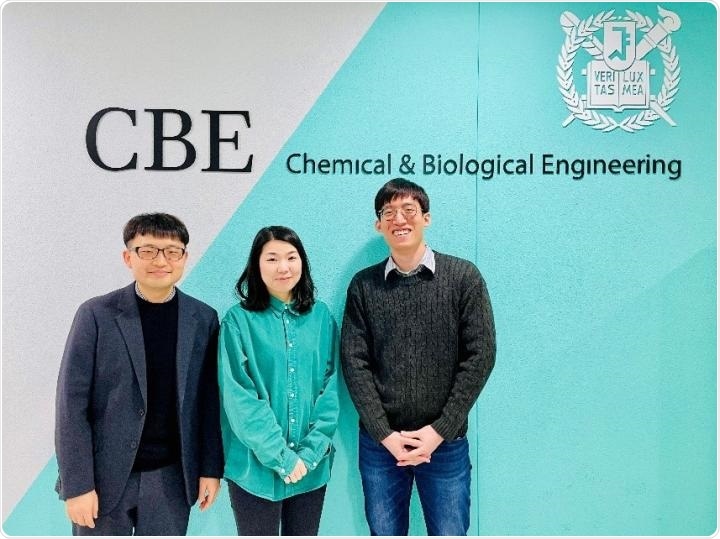Professor Sang Woo’s research group, which included Dr. Jina Yang and Mr. Yong Hee Han, from the School of Chemical and Biological Engineering has designed a synthetic protein quality control system to improve the full-length translation in bacteria.
It is believed that this technology will boost the efficiency of the development of bio-based chemicals, industrial enzymes, and biopharmaceuticals.

From left to right, Professor Sang Woo Seo, Dr Jina Yang, and Mr Yong Hee Han. Image Credit: Seoul National University.
This announcement was made on February 5th, 2020 by the College of Engineering (Dean Kookheon Char) at Seoul National University.
Recombinant proteins are utilized in many manufacturing fields ranging from protein drugs, like insulin, to industrial proteins, like laundry detergents. Since proteins can only execute their functions with a proper and full-length 3D structure, the production of recombinant proteins using microbial cell factories involves a number of protein purification steps.
To improve the yield of the manufacturing process, scientists have developed strain enhancement methods to increase the expression level of the target proteins or to supplement inadequate amino acids in a cell. But since translation and transcription steps take place in the same site in bacteria, truncated mRNA can be used as a template for translation by ribosomes, leading to the synthesis of incomplete polypeptides.
The Protein Quality Control System, or ProQC for short, designed by Professor Seo’s research group, is an artificial gene expression cassette that enables ribosomes to only utilize intact mRNA as a template. The translation process in eukaryotic expression systems is performed after the completion of the transcription process.
By imitating this and when the transcription process is finished, the cis-trigger element at the 3'end of mRNA will hybridize with the Toehold switch at the 5'end and reveal the ribosome binding sites to the translation. The mRNA also becomes circular that ensures efficient re-initiation of ribosomes.
When the ProQC system was used on different protein expressions, the bacterial cells were able to synthesize more full-length proteins (up to 250%). Additionally, when the enzymes in the biochemical synthesis routes were expressed under the guidance of the ProQC system, the production levels of the target metabolites were also increased more than twice.
The gene expression system developed in this study allows bacteria to selectively translate intact mRNA to synthesize high-quality proteins by themselves. Also, as this technology is applied to a new level of regulation, there will be synergies when used with existing recombinant protein production strategies. It will dramatically improve the efficiency of the microbial cell factory-based recombinant protein and biochemical production.”
Professor Sang Woo, School of Chemical and Biological Engineering, Seoul National University
Source:
Journal reference:
Yang, J., et al. (2021) Synthetic protein quality control to enhance full-length translation in bacteria. Nature Chemical Biology. doi.org/10.1038/s41589-021-00736-3.